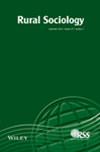The Dignity of Nonworking Men*
IF 2.3
3区 社会学
Q2 SOCIOLOGY
引用次数: 0
Abstract
Studies have demonstrated the centrality of work and dignity in men's understanding of themselves and their place in society, especially in rural areas. However, previous studies of work and identity among men have generally drawn from the perspectives of the employed. From interviews with nonmetro prime‐age men (25–54 years old) who were out of the formal labor force (无工作男性的尊严*
研究表明,工作和尊严是男性(尤其是农村地区的男性)理解自身及其社会地位的核心。然而,以往对男性工作和身份认同的研究一般都是从就业者的角度出发。通过对未加入正规劳动力队伍的非都会壮年男性(25-54 岁)(N = 61)的访谈,我们发现男性认为自己应该得到有尊严的待遇。他们这样做的方式是利用工作的价值--将自己描述为技术娴熟、勤奋努力、具有强烈个人责任感的工人。具有讽刺意味的是,这种自我价值感可能会与他们留在正规劳动力队伍中发生冲突,因为他们在工作中受到的待遇和其他人的行为举止都会影响到他们。在这种农村环境中,即使在工作体制之外,霸权的市场价值观也会引导男性,但有些男性发现,他们只能在这些价值观与正规劳动力市场之外的就业现实之间解决矛盾。
本文章由计算机程序翻译,如有差异,请以英文原文为准。
求助全文
约1分钟内获得全文
求助全文
来源期刊

RURAL SOCIOLOGY
SOCIOLOGY-
CiteScore
4.60
自引率
13.00%
发文量
47
期刊介绍:
A forum for cutting-edge research, Rural Sociology explores sociological and interdisciplinary approaches to emerging social issues and new approaches to recurring social issues affecting rural people and places. The journal is particularly interested in advancing sociological theory and welcomes the use of a wide range of social science methodologies. Manuscripts that use a sociological perspective to address the effects of local and global systems on rural people and places, rural community revitalization, rural demographic changes, rural poverty, natural resource allocations, the environment, food and agricultural systems, and related topics from all regions of the world are welcome. Rural Sociology also accepts papers that significantly advance the measurement of key sociological concepts or provide well-documented critical analysis of one or more theories as these measures and analyses are related to rural sociology.
 求助内容:
求助内容: 应助结果提醒方式:
应助结果提醒方式:


